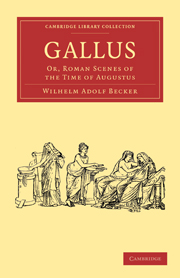Book contents
- Frontmatter
- Translator's Preface
- Author's Preface
- Contents
- ERRATUM
- SCENE THE FIRST THE NOCTURNAL RETURN HOME
- SCENE THE SECOND THE MORNING
- SCENE THE THIRD STUDIES AND LETTERS
- SCENE THE FOURTH THE JOURNEY
- SCENE THE FIFTH THE VILLA
- SCENE THE SIXTH LYCORIS
- SCENE THE SEVENTH A DAY AT BAIÆ
- SCENE THE EIGHTH THE DISPLEASURE OF AUGUSTUS
- SCENE THE NINTH THE BANQUET
- SCENE THE TENTH THE DRINKERS
- SCENE THE ELEVENTH THE CATASTROPHE
- SCENE THE TWELFTH THE GRAVE
- APPENDIX
- Excursus I Roman Marriage
- Excursus II Education
- Excursus I The Roman House
- Excursus II The Slave Family
- Excursus I The Library
- Excursus II The Books
- Excursus III The Booksellers
- Excursus IV The Letter
- Excursus V The Clocks and Divisions of Time
- Excursus I The Lectica and the Carriages
- Excursus II The Inns
- Excursus I The Game of Ball, and other Gymnastic Exercises
- Excursus II The Gardens
- Excursus: The Dress of the Women
- Excursus: The Baths
- Excursus: The Male Attire
- Excursus I The Meals
- Excursus II The Triclinium
- Excursus III The Table Utensils
- Excursus IV The Drinks
- Excursus I The Manner of Lighting
- Excursus II The Garlands
- Excursus III The Social Games
- Excursus: The Manner of Closing the Doors
- Excursus: The Interment of the Dead
- Index
Excursus: The Baths
Published online by Cambridge University Press: 10 November 2010
- Frontmatter
- Translator's Preface
- Author's Preface
- Contents
- ERRATUM
- SCENE THE FIRST THE NOCTURNAL RETURN HOME
- SCENE THE SECOND THE MORNING
- SCENE THE THIRD STUDIES AND LETTERS
- SCENE THE FOURTH THE JOURNEY
- SCENE THE FIFTH THE VILLA
- SCENE THE SIXTH LYCORIS
- SCENE THE SEVENTH A DAY AT BAIÆ
- SCENE THE EIGHTH THE DISPLEASURE OF AUGUSTUS
- SCENE THE NINTH THE BANQUET
- SCENE THE TENTH THE DRINKERS
- SCENE THE ELEVENTH THE CATASTROPHE
- SCENE THE TWELFTH THE GRAVE
- APPENDIX
- Excursus I Roman Marriage
- Excursus II Education
- Excursus I The Roman House
- Excursus II The Slave Family
- Excursus I The Library
- Excursus II The Books
- Excursus III The Booksellers
- Excursus IV The Letter
- Excursus V The Clocks and Divisions of Time
- Excursus I The Lectica and the Carriages
- Excursus II The Inns
- Excursus I The Game of Ball, and other Gymnastic Exercises
- Excursus II The Gardens
- Excursus: The Dress of the Women
- Excursus: The Baths
- Excursus: The Male Attire
- Excursus I The Meals
- Excursus II The Triclinium
- Excursus III The Table Utensils
- Excursus IV The Drinks
- Excursus I The Manner of Lighting
- Excursus II The Garlands
- Excursus III The Social Games
- Excursus: The Manner of Closing the Doors
- Excursus: The Interment of the Dead
- Index
Summary
THE bath was a most important event in the every day life of the Romans of that period which, is here principally described, and one of their most essential requirements. Bodily health and cleanliness, although its original object, had long ceased being the only one; for the baths, decorated with prodigal magnificence, and supplied with all the comforts and conveniences that a voluptuary could desire, had become places of amusement, whither people repaired for pastime and enjoyment. In earlier times, bathing was much less frequent, as Seneca tells us, citing the authority of more ancient authors. Epist. 86: Nam, ut aiunt, qui priscos mores urbis tradiderunt (perhaps Varro) brachia et crura quotidie abluebant, quœ scilicet sordes opere collegerant, cœterum toti nundinis lavabantur. Cato, de lib. educ. in Non. iii. 5, says, ephippium: Mihi puero modica una fuit tunica et toga, sine fasciis calceamenta, equus sine ephippio, balneum non quotidianum, alveus rarus. And Columella does not approve of the slaves bathing daily or frequently, (i. 6, 20): nam eas quoque (balneas) refert esse, in quibus familia, sed tantum feriis lavetur, neque enim corporis robori, convenit frequens usus earum.
Hence the ancient baths, both public and private, being in the words of Seneca, in usum, non obleclamentum reperta, were of very simple construction. In the villa of Scipio Africanus, where Seneca found so much cause for instituting a comparison between the ancient and modern times, there was a balneolum angustum, tenebricosum ex consuetudine antiqua.
- Type
- Chapter
- Information
- GallusOr, Roman Scenes of the Time of Augustus, pp. 299 - 332Publisher: Cambridge University PressPrint publication year: 2010First published in: 1844

